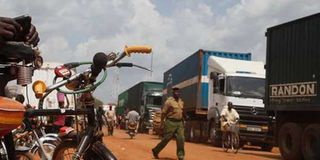Ugandan police detain Kenyan woman suspected of human trafficking

The Kenya-Uganda border in Busia. Ugandan police have detained a Kenyan woman suspected to be involved in a human trafficking syndicate. FILE PHOTO | TOM OTIENO | NATION MEDIA GROUP
What you need to know:
- The woman, together with others, Ugandan police said, had recruited many locals for domestic jobs in the Middle East only to turn out to be enslavement parades once they landed in the Arab countries.
- The arrest comes amid renewed crackdown on suspected traffickers, who Ugandan police say have contacts in all East African countries including Kenya, where they coordinate their crime.
- On Friday, two people, a Kenyan and Somali were arrested with four children in Tharaka-Nithi County in Kenya in what police also suspect to be a human trafficking incident.
Ugandan police have detained a Kenyan woman suspected to be involved in a human trafficking syndicate.
Ms Khalima Abdalla, who is married to a Ugandan, was arrested on Friday in Makindye, a suburb south of Kampala City in the latest crackdown on suspected traffickers.
The woman, together with others, Ugandan police said, had recruited many locals for domestic jobs in the Middle East only to turn out to be enslavement parades once they landed in the Arab countries.
“Ms Khalima is suspected to have used her company, that is, Turkey Business Solutions in 2015, to recruit people for the benefit of employment in Arab countries like Saudi Arabia, Dubai (United Arab Emirates) and others as housekeepers and cleaners,” Ms Polly Namaye, the deputy director for media and public relations said in a statement on Friday evening.
“The police…received complaints of mistreatment, sexual harassment, assault, denial of payment and abuse of those who had been taken under this company,” the official added.
The arrest comes amid renewed crackdown on suspected traffickers, who Ugandan police say have contacts in all East African countries including Kenya, where they coordinate their crime.
According to authorities in Uganda, the Kenyan woman and her company lured Ugandans, Kenyans and Rwandans with lucrative job offers in the Middle East. They could pay a fee and have documents processed for them, but only signed contracts upon arriving in those countries.
A majority of them ended up in Saudi Arabia. But last week, a video emerged on social media, supposedly showing some of the recruits being tortured.
Ms Namaye said the police would conduct further investigations before charging the suspect.
On Friday, two people, a Kenyan and Somali were arrested with four children in Tharaka-Nithi County, in Kenya in what police also suspect to be a human trafficking incident.
The two were found with the children who could only understand or speak Somali language in a matatu from Maua in Meru heading to Nairobi.
The Somali man, identified as Isman Hussin, and who had his country’s passport, could also only speak or understand Somali language.
On interrogation, Mr Hussin and the woman said they met in the matatu and did not know each other. They added that the parents of some of the children worked in South Africa.
Maara OCPD John Njihia said police were holding the suspects for investigations.
Uganda, like Kenya, banned domestic labour export to the Middle East two years ago, but it appears the vice has continued unabated. Besides domestic workers, some children may also be recruited under the guise of sports opportunities abroad.
GOVT OFFICIALS ARE COMPLICIT
The 2015 "Trafficking in Persons (TIP)" report released by the US Department of State said both Uganda and Kenya continue to be sources, conduits and destinations of trafficked people because of complicity of government officials.
Ugandan women, the report charged, are fraudulently recruited for employment in the Middle East where they are exploited and forced into prostitution in the United Arab Emirates (UAE), Oman, Saudi Arabia, and Qatar.
“Kampala-based labour recruiters and brokers also operated in Rwanda, and Nairobi-based recruiters were active in Uganda, recruiting Ugandans and resident Rwandans and Kenyans through fraudulent offers of employment in the Middle East and Asia,” the report added.
The report ranked both Kenya and Uganda in "Tier 2", a category where countries do not fully comply with the 2000 Trafficking Victims Protection Act's minimum standards but are making significant efforts to bring themselves into compliance with those standards.
Uganda passed its anti-trafficking-in-persons laws in 2009 while Kenya enacted a similar law in 2010.
Another report by the International Organisation for Migration (IOM) last year called for a closer cooperation among East African nations especially since the region is politically unstable and has high unemployment rates.
“TiP [trafficking in persons] does not suddenly manifest itself in an isolated situation. The links between the vulnerability of populations and exploitive practices which existed prior to a crisis need to be factored into a humanitarian response,” IOM researchers observed in a document titled "Addressing Human Trafficking and Exploitation in Times of Crisis."
Additional reporting by Alex Njeru





